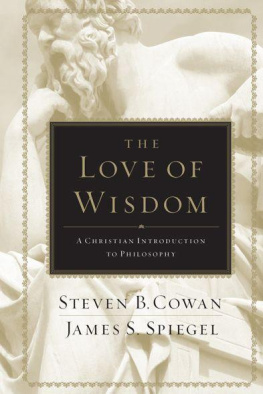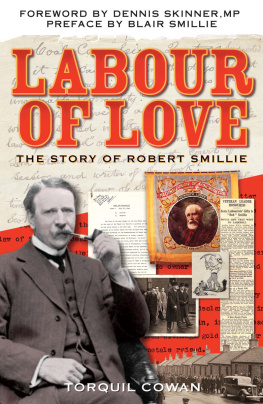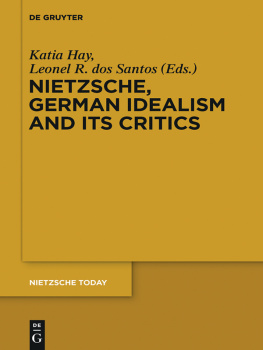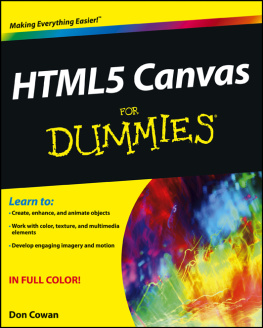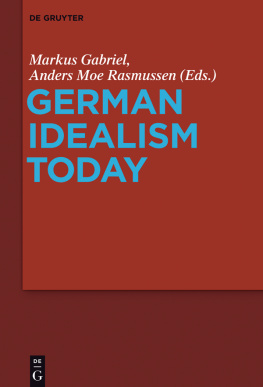Steven B. Cowan - Idealism and Christian Philosophy
Here you can read online Steven B. Cowan - Idealism and Christian Philosophy full text of the book (entire story) in english for free. Download pdf and epub, get meaning, cover and reviews about this ebook. year: 2019, publisher: Bloomsbury USA, genre: Religion. Description of the work, (preface) as well as reviews are available. Best literature library LitArk.com created for fans of good reading and offers a wide selection of genres:
Romance novel
Science fiction
Adventure
Detective
Science
History
Home and family
Prose
Art
Politics
Computer
Non-fiction
Religion
Business
Children
Humor
Choose a favorite category and find really read worthwhile books. Enjoy immersion in the world of imagination, feel the emotions of the characters or learn something new for yourself, make an fascinating discovery.
- Book:Idealism and Christian Philosophy
- Author:
- Publisher:Bloomsbury USA
- Genre:
- Year:2019
- Rating:4 / 5
- Favourites:Add to favourites
- Your mark:
- 80
- 1
- 2
- 3
- 4
- 5
Idealism and Christian Philosophy: summary, description and annotation
We offer to read an annotation, description, summary or preface (depends on what the author of the book "Idealism and Christian Philosophy" wrote himself). If you haven't found the necessary information about the book — write in the comments, we will try to find it.
Idealism and Christian Philosophy — read online for free the complete book (whole text) full work
Below is the text of the book, divided by pages. System saving the place of the last page read, allows you to conveniently read the book "Idealism and Christian Philosophy" online for free, without having to search again every time where you left off. Put a bookmark, and you can go to the page where you finished reading at any time.
Font size:
Interval:
Bookmark:

Idealism and Christian Philosophy
Idealism and Christianity
General Editor: James S. Spiegel
Volume 1: Idealism and Christian Theology
Edited by Joshua R. Farris, S. Mark Hamilton, and James S. Spiegel
Volume 2: Idealism and Christian Philosophy
Edited by Steven B. Cowan and James S. Spiegel
Idealism and Christian Philosophy
Edited by
Steven B. Cowan and James S. Spiegel
Idealism and Christianity
Volume 2
Bloomsbury Academic
An imprint of Bloomsbury Publishing Inc

To George Berkeley, Bishop of Cloyne
Contents
Steven B. Cowan and James S. Spiegel
James S. Spiegel
Gregory E. Trickett
Steven B. Cowan
Howard Robinson
Charles Taliaferro
Adam Groza
Benjamin H. Arbour
Douglas K. Blount
Marc A. Hight
Keith Ward
This book is the result of a dedicated team effort, from initial conception to printing and distribution. We would like to thank each of the authors who contributed to this volume. We are grateful not only for their insights and timely work but especially for their patience and grace in dealing with our incessant demands!
We also want to thank Joshua Farris and Mark Hamilton, editors of the first volume in this series and helpful advisers for this volume. It was a case of extraordinary serendipity that brought us together for this project. Joshua and Mark were already at work on their volume on idealism and theology when we learned about their project, which was at about the same stage of development as ours. So we joined forces, hatching the plan for a two-volume series, which the good folks at Bloomsbury have now made a reality. We are immensely thankful to their editorial and production team, especially Haaris Naqvi who shared our vision for this ambitious project from the start and has so patiently worked with us along the way.
I (Steve Cowan) also wish to thank my friend and coeditor, Jim Spiegel, whose espousal of Berkeleyan idealism has always led me to take it seriously and not dismiss it as so many do, and whose patient answering of my many questions finally helped me, after many years, to embrace it. And I thank all the students who have endured my lectures on Berkeley over the years and whose tough questions pushed me to hone my own understanding, and eventually defense, of his idealist philosophy. Lastly, I thank my wife and my son for their encouragement and patience while I worked on this book. You are truly a blessing to me.
I (Jim Spiegel) want to thank Steve for coming up with the idea for this book almost immediately upon his conversion to the Berkeleyan idealist perspective! It has been a pleasure working with him and benefiting, both as a writer and editor, from his superb scholarship. Thanks also to my students at Taylor University for sharpening my thinking about idealism and its implications. And, lastly, I am grateful to my wonderful wife and four children for their constant support and encouragement.
Finally, we think it is appropriate to express our gratitude for the good bishop himself, George Berkeley, whose influence remains strong even three centuries since defending his idealist thesis. This volume stands as a testament to this fact. And we hope that, as Berkeley wished for his own Principles of Human Knowledge, this book, too, will somehow serve to inspire [our] readers with a pious sense of the presence of God.
Steven B. Cowan and James S. Spiegel
Soli Deo Gloria
Summer, 2015
Steven B. Cowan and James S. Spiegel
Perhaps no term in the philosophical lexicon has been the source of more confusion (or scorn) than idealism. As evident in the fact that the word is used to categorize thinkers as wide-ranging as Plato, Eriugena, Berkeley, Kant, and Hegel, the doctrine itself is maddeningly ambiguous, always requiring some qualification. And, even when properly qualified, there are the common, if understandable, misinterpretations and straw man dismissals of the doctrine that abound even among otherwise careful thinkers. So, any volume dedicated to the topic is bound to be fraught with peril, particularly a book concerned with the most misconstrued of all idealisms: Berkeleyan idealism. And these challenges could only be exacerbated by integrating its analysis with a Christian theological perspective. So why do such a thing? Because, briefly put, the benefits are worth the risks.
We believe that Berkeleyan idealismthe thesis that all that exists are minds and their ideashas immense benefits for virtually every area of human understanding, from theoretical issues in philosophy and theology to the most practical concerns of human life. This was certainly the conviction of the inspiration for this volumeGeorge Berkeley, the eighteenth-century Bishop of Cloyne, who concluded his most famous philosophical work as follows:
What deserves the first place in our studies is the consideration of God and our duty; which to promote, as it was the main drift and design of my labors, so shall I esteem them altogether useless and ineffectual if, by what I have said, I cannot inspire my readers with a pious sense of the presence of God; and having shown the falseness or vanity of those barren speculations which make the chief employment of learned men, the better dispose them to reverence and embrace the salutary truths of the Gospel, which to know and to practice is the highest perfection of human nature.
As an orthodox Christian, and eventual leader in the Anglican church, Berkeley was first and foremost concerned with nourishing the faith of his readers and prodding them to lives of virtue. He was deeply convinced that his brand of idealism, properly understood, would help to reinforce such faith and virtue in the life of any believer. And, in terms of his negative aims, he was equally persuaded that this thesis could be a powerful inoculation against the rise of atheism, agnosticism, and religious skepticism in Europe at the time. In short, Berkeley saw his thesis that to be is to be a perceived or to be a perceiver as a powerful boon to faith in God.
Lets consider Berkeleys argument in defense of this thesis. His starting point is the observation that physical objects are nothing more than their perceivable qualities. John Locke had proposed that underlying the qualities of an objectits color, texture, shape, and so onis some sort of material substratum that is itself unperceivable. He argued that such a thing must be there in order to account for the unity and persistence of physical objects. Further, as a confessed empiricist, Locke insisted that all of our ideas must come to us through sensation. Yet this supposed material substratum (or substance) cannot be perceived and/or accessed in any way via the senses. This explains why Locke dubbed his material substance I know not whata tacit admission that he literally had no idea what he was talking about.
Berkeley countered that we cannot even imagine an unperceived physical object. To try to imagine anything is to entertain certain qualities of the thing, but by definition Lockean substance itself has no qualities but lies beneath them. So Berkeley concludes that the very notion of material substance is repugnant, for when I consider the two parts or branches which make the signification of the words material substance, I am convinced there is no distinct meaning annexed to them. Another problem with the doctrine, Berkeley tells us, is that given the existence of God, the supposition of a material substratum is not necessary. Why theorize about an unknown, unthinking stuff supporting the perceivable qualities we experience when an all-knowing, all-powerful deity is more than sufficient to account for this?
Font size:
Interval:
Bookmark:
Similar books «Idealism and Christian Philosophy»
Look at similar books to Idealism and Christian Philosophy. We have selected literature similar in name and meaning in the hope of providing readers with more options to find new, interesting, not yet read works.
Discussion, reviews of the book Idealism and Christian Philosophy and just readers' own opinions. Leave your comments, write what you think about the work, its meaning or the main characters. Specify what exactly you liked and what you didn't like, and why you think so.


